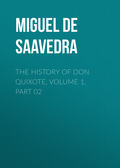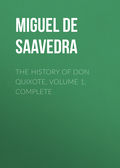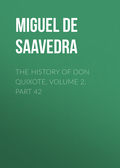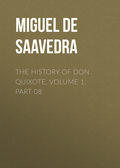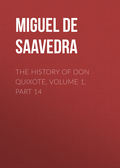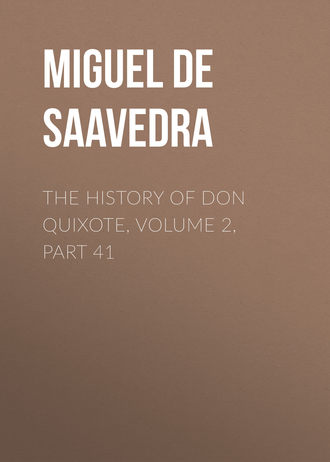
Мигель де Сервантес Сааведра
The History of Don Quixote, Volume 2, Part 41
"I don't know whether I am good," said Don Quixote, "but I can safely say I am not 'the Bad;' and to prove it, let me tell you, Senor Don Alvaro Tarfe, I have never in my life been in Saragossa; so far from that, when it was told me that this imaginary Don Quixote had been present at the jousts in that city, I declined to enter it, in order to drag his falsehood before the face of the world; and so I went on straight to Barcelona, the treasure-house of courtesy, haven of strangers, asylum of the poor, home of the valiant, champion of the wronged, pleasant exchange of firm friendships, and city unrivalled in site and beauty. And though the adventures that befell me there are not by any means matters of enjoyment, but rather of regret, I do not regret them, simply because I have seen it. In a word, Senor Don Alvaro Tarfe, I am Don Quixote of La Mancha, the one that fame speaks of, and not the unlucky one that has attempted to usurp my name and deck himself out in my ideas. I entreat your worship by your devoir as a gentleman to be so good as to make a declaration before the alcalde of this village that you never in all your life saw me until now, and that neither am I the Don Quixote in print in the Second Part, nor this Sancho Panza, my squire, the one your worship knew."
"That I will do most willingly," replied Don Alvaro; "though it amazes me to find two Don Quixotes and two Sancho Panzas at once, as much alike in name as they differ in demeanour; and again I say and declare that what I saw I cannot have seen, and that what happened me cannot have happened."
"No doubt your worship is enchanted, like my lady Dulcinea del Toboso," said Sancho; "and would to heaven your disenchantment rested on my giving myself another three thousand and odd lashes like what I'm giving myself for her, for I'd lay them on without looking for anything."
"I don't understand that about the lashes," said Don Alvaro. Sancho replied that it was a long story to tell, but he would tell him if they happened to be going the same road.
By this dinner-time arrived, and Don Quixote and Don Alvaro dined together. The alcalde of the village came by chance into the inn together with a notary, and Don Quixote laid a petition before him, showing that it was requisite for his rights that Don Alvaro Tarfe, the gentleman there present, should make a declaration before him that he did not know Don Quixote of La Mancha, also there present, and that he was not the one that was in print in a history entitled "Second Part of Don Quixote of La Mancha, by one Avellaneda of Tordesillas." The alcalde finally put it in legal form, and the declaration was made with all the formalities required in such cases, at which Don Quixote and Sancho were in high delight, as if a declaration of the sort was of any great importance to them, and as if their words and deeds did not plainly show the difference between the two Don Quixotes and the two Sanchos. Many civilities and offers of service were exchanged by Don Alvaro and Don Quixote, in the course of which the great Manchegan displayed such good taste that he disabused Don Alvaro of the error he was under; and he, on his part, felt convinced he must have been enchanted, now that he had been brought in contact with two such opposite Don Quixotes.
Evening came, they set out from the village, and after about half a league two roads branched off, one leading to Don Quixote's village, the other the road Don Alvaro was to follow. In this short interval Don Quixote told him of his unfortunate defeat, and of Dulcinea's enchantment and the remedy, all which threw Don Alvaro into fresh amazement, and embracing Don Quixote and Sancho he went his way, and Don Quixote went his. That night he passed among trees again in order to give Sancho an opportunity of working out his penance, which he did in the same fashion as the night before, at the expense of the bark of the beech trees much more than of his back, of which he took such good care that the lashes would not have knocked off a fly had there been one there. The duped Don Quixote did not miss a single stroke of the count, and he found that together with those of the night before they made up three thousand and twenty-nine. The sun apparently had got up early to witness the sacrifice, and with his light they resumed their journey, discussing the deception practised on Don Alvaro, and saying how well done it was to have taken his declaration before a magistrate in such an unimpeachable form. That day and night they travelled on, nor did anything worth mention happen them, unless it was that in the course of the night Sancho finished off his task, whereat Don Quixote was beyond measure joyful. He watched for daylight, to see if along the road he should fall in with his already disenchanted lady Dulcinea; and as he pursued his journey there was no woman he met that he did not go up to, to see if she was Dulcinea del Toboso, as he held it absolutely certain that Merlin's promises could not lie. Full of these thoughts and anxieties, they ascended a rising ground wherefrom they descried their own village, at the sight of which Sancho fell on his knees exclaiming, "Open thine eyes, longed-for home, and see how thy son Sancho Panza comes back to thee, if not very rich, very well whipped! Open thine arms and receive, too, thy son Don Quixote, who, if he comes vanquished by the arm of another, comes victor over himself, which, as he himself has told me, is the greatest victory anyone can desire. I'm bringing back money, for if I was well whipped, I went mounted like a gentleman."



